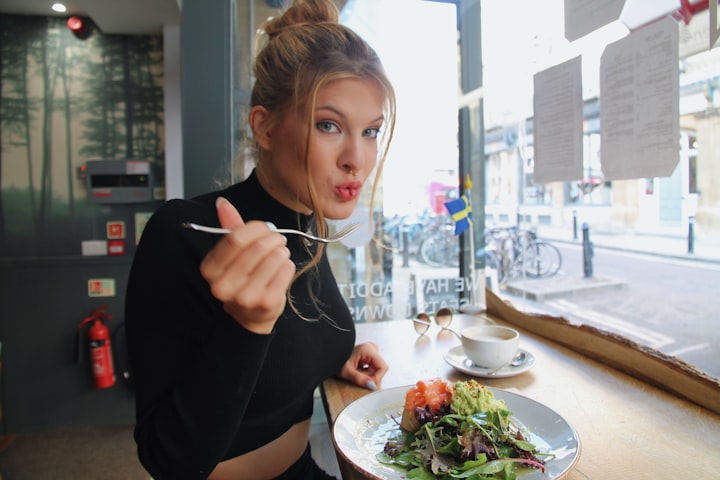
Many instances have passed when I eat less, but not the right things.
The opposite is also a reality - we may be eating more, but it's not necessarily the right thing.
So then, how does a woman know if she's eating enough food to sustain daily basic activities, as well as for a high level of training (and stay lean)?
The problem lies with us ladies - we can sometimes become far too preoccupied with the pressure of our body image than actually eating enough to supplement the increased levels of training.
Another problem is that training doesn't necessarily increase your appetite.
The opposite is true.
Do you sometimes feel more hungry when you train less (or not train) than you do when training?
Although this doesn't apply to all females that exercise, there is some truth when you start to uncover your eating habits.
There have been many times when I do not eat enough as I should. Or, the age-old and yet inaccurate assumption that eating more food will increase body fat levels is not entirely true.
When you think about what you are eating, the wrong foods can create unnecessary fat stores than wholesome, natural and nourishing choices.
Does that sugar-filled doughnut count as added fat stores on your body?
One won't make a difference; it's the constant indulgences we allow ourselves to have that make a HUGE difference.
Do you find yourself giving in yet again to eating less - or for the sake of your body shape paranoia?
If the answer is yes, check out the following points to help you increase your calories to the proper levels without leaving you guilt-stricken.
One: Find out how many calories you need based on your activity levels
Several online calculators will give you a rough figure of macros based on your activity levels.
I would take anything that's standardised with a grain of salt.
There are many variables to consider, and it depends on your activity levels and genetics.
Seeking a professional is essential for athletes preparing for an event.
Anyone else can get away with an online calculator and tweak it at will.
Check out this calculator here.
Two: Spend the time and money with a professional
I would invest in personal trainers who have a sound level of nutritional knowledge.
Men and women have different dietary needs, and they should be based on our training and the results we want.
No one should receive a cookie-cutter approach towards their goals. Run a mile if your trainer is heading in this direction.
It does pay to work in conjunction with someone that specialises in the type of training you are doing, rather than someone with basic and all-around knowledge.
For example, if you are training for a marathon, seek a nutritionist that specialises in it. The same goes for bodybuilding.
Three: Use nutritional timing to match your training levels
Your training should reflect nutrition increases or decreases.
If you are working out at intense and high levels, you will need to supplement with more food and lower your calories upon rest days.
I would play around with carbohydrates more than protein, and carb cycling might be a great alternative.
This cuts the confusion and gives you an easy to follow strategy.
Four: Keep a food log
Keeping tabs on your meals should give you an indication as to whether you are eating enough or not.
But, it will only work if you are honest with what you put down.
It's also a good idea to note the mood you were in after you ate the food, plus any gut or stomach disturbances that may have occurred.
Finally, it's a good indicator of particular foods you might need to eliminate.
Sometimes, a specific food or mood can trigger a misalignment with our minds and body.
Five: Make it a priority to eat the right foods to supplement your life, and training
To eat well is not only about the primary macronutrient count.
It's also about how certain foods make you feel mentally, physically and also on a satisfactory level.
Sure, it's nice to have chocolate once in a while, but having it every single day isn't a great idea.
If we focus on making the most of our meals by eating the best possible nutrients, we are giving our bodies exactly what they need to function every day and helping us achieve those fitness goals.
When I'm about to eat something naughty, I always ask myself, "Is this serving me to achieve my goals or just an initial craving?"
Look at the answer and be honest. It's your choice to have that bar of chocolate or put it down and not have anything.
These little detailed nutritional choices can make or break your health and fitness goals. So, think about what you eat carefully, and become super vigilant as to the results it will give you after you do eat it!
What has been your experience with nutrition, when it comes to training for a particular event?
If you would like to express gratitude with coffee, send the love via this link.
Originally featured in Medium.
About the Creator
Ange Dim
My mission is to help people become the best version of themselves through nutrition, exercise and mindset. Get your dose of coaching every week here: https://anged.substack.com/subscribe






Comments
There are no comments for this story
Be the first to respond and start the conversation.